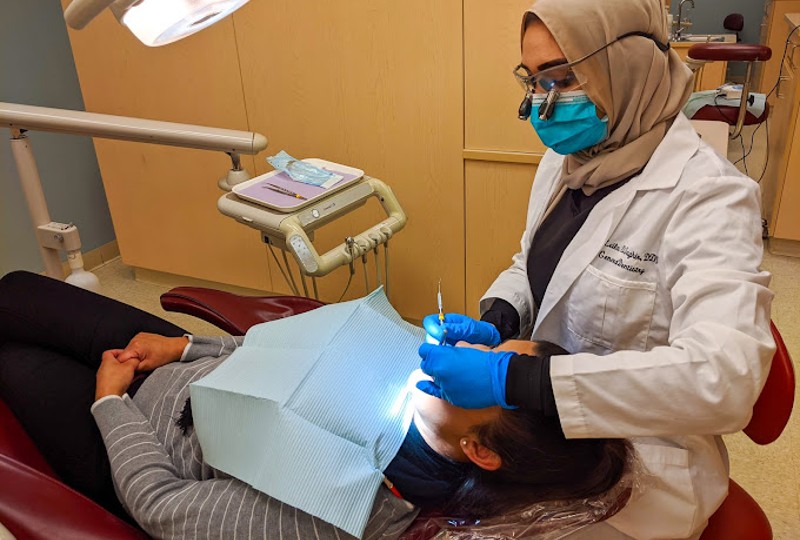Proper post-operative care is essential for achieving optimal healing and the long-term success of dental implants. By following dental implant aftercare instructions, you can ensure a smooth recovery and reduce the likelihood of complications.
We’re here to answer the key questions and concerns regarding post-dental implant care:
- What to expect in the first few days after surgery
- How to manage pain and swelling
- Oral hygiene practices after implant surgery
- Dietary restrictions and recommendations
- When to return for follow-up appointments
- Complications after dental implant surgery
What Should I Expect After Dental Implant Surgery?
In the first 24 hours after dental implant surgery, mild to moderate swelling and discomfort are common. These symptoms can be managed with prescribed analgesics and cold compresses. Generally, recovery within four days after dental implant placement is expected, although individual healing times may vary.
Recovery After Dental Implant Placement
The First 24-48 Hours
- Bleeding: Light bleeding is normal after dental implant surgery. To manage it, apply gentle pressure with gauze pads over the surgical site. If bleeding persists beyond 24 hours or becomes heavy, contact your dentist immediately.
- Swelling: Swelling is expected and may peak within 2-3 days. Minimize swelling by using cold compresses and keeping your head elevated.
- Pain Management: Your dentist will prescribe pain medication, such as ibuprofen or acetaminophen, to manage discomfort. Follow the dosage instructions carefully to ensure effective pain management.
- Rest and Relaxation: Rest is essential for optimal healing. Avoid strenuous activities and take it easy for the first few days.
- Antibiotics: If your dentist prescribes antibiotics, complete the entire course to minimize the risk of infection.
- Mouthwash: Avoid using mouthwash immediately after surgery. Spitting can disturb healing blood clots and potentially cause dry socket.
Oral Hygiene After Implant Surgery
Good oral hygiene is vital for preventing infection and promoting healing. Here are some key points:
- Brushing and Flossing: Maintaining cleanliness around the surgical site is crucial. Use a soft-bristled toothbrush to gently brush your teeth, being careful to avoid direct contact with the implant itself. It’s important to clean the surrounding teeth and gums without disturbing the healing area. Flossing should be done cautiously, avoiding the implant site until your dentist advises it’s safe.
- Use of Mouth Rinse: Your dentist may recommend using a chlorhexidine mouthwash to reduce bacterial load and support oral hygiene. This antiseptic mouthwash can be beneficial in maintaining cleanliness around the surgical area. Use it as directed by your dentist, typically twice a day. Be sure to avoid mouthwashes containing alcohol or other irritants, as these can cause discomfort and delay healing.
- Antiseptic Mouthwash: Using an antiseptic mouthwash offers extra protection against infection. Discuss the potential use of a dentist-recommended antiseptic mouthwash for additional cleaning and avoid mouthwashes that contain irritants like alcohol. Certain antiseptic mouthwashes are designed to minimize bacteria without causing irritation to the surgical area.
Dietary Recommendations
- Soft Foods: Stick to soft, cool foods, like mashed potatoes, yogurt, and soups, for the first few days to minimize discomfort and promote healing.
- Chewing: Avoid chewing directly on the implant site. Favor the opposite side of your mouth to prevent pressure on the implant.
- Gradual Transition: Gradually reintroduce regular foods as healing progresses. Start with soft foods and slowly move to more solid foods as tolerated.
- Hydration: Stay well-hydrated to support overall recovery and aid in medication absorption.
- Avoiding Irritants: Avoid hard, crunchy, and spicy foods, as well as tobacco and alcohol, to prevent irritation and promote healing.
Signs of Complications After Dental Implant Surgery
Signs of complications after dental implant surgery include severe pain, excessive bleeding, swelling that worsens, pus, or fever, which should prompt an immediate call to your dentist. Regular dental visits are essential to monitor the health of your dental implants and to ensure long-term success.
When to Contact Your Dentist
Contact your dentist immediately if you experience severe pain, excessive bleeding, swelling that worsens, signs of infection (such as pus, fever, or a foul taste in your mouth), or any other unusual symptoms. Early intervention is crucial to address potential complications and ensure a smooth recovery. Additionally, follow your dentist’s instructions on pain management, including the use of prescribed medications and cold compresses to reduce swelling
Schedule Your Follow-Up Appointment
At New You Dental Center, your post-operative care is our top priority. We have five convenient locations in Michigan: Auburn Hills, Flint, Lansing, Livonia, and Southfield. To ensure the long-term success of your dental implant and to monitor your recovery, schedule your follow-up appointment today. We understand that complications can arise unexpectedly. That’s why we offer same-day emergency appointments for any urgent issues, such as severe pain, excessive bleeding, or signs of infection. Our dedicated team is here to provide the support and care you need for a smooth and successful recovery.
Contact us now to book your follow-up dental implant appointment
